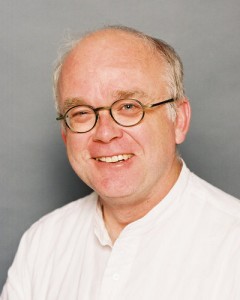
By Stuart Mann
The “old man” of the Toronto HIV/AIDS community is being recognized by his peers for almost 25 years of leadership and achievement within the movement.
The Rev. Canon Douglas Graydon, the diocese’s coordinator of Chaplaincy Services, will be given the Community Partners Award by the Ontario AIDS Network at its annual gala dinner on Nov. 12 in Toronto. The distinction recognizes an individual or organization that provides resources, research or treatment to improve the quality of life and dignity for people living with HIV/AIDS.
“When I was ordained almost 30 years ago, I never thought HIV/AIDS would be such a dominant theme throughout my entire career,” says Canon Graydon. “It’s done wonderful things for my faith and also challenged me profoundly. So it’s really gratifying to be the recipient of this kind of award. I also think it speaks well of the Diocese of Toronto and Archbishop Colin Johnson’s desire to be part of the solution around the whole HIV/AIDS issue.”
Canon Graydon is likely the first representative of a faith group to receive the award. “In all the years I’ve been working in HIV and AIDS, it hasn’t been advantageous for me to be coming from a recognized faith community because the AIDS community has been pretty distrustful of organized religion. But I just keep plugging away and doing what I can.”
As a hospital chaplain in the early 1980s, Canon Graydon developed a reputation in the HIV/AIDS community as one of the few ordained people who would visit and provide ministry to people with HIV.
Canon Graydon also broke new ground as a chaplain at Casey House, a specialty hospital in Toronto for people living with HIV/AIDS. “I just kept trying to promote what I believe, which is that organized religion or religious and spiritual care had a role to play in the HIV/AIDS world, and I’ve been doing that ever since.” At the end of his tenure at Casey House, he had developed a course on spiritual wellness for people living with HIV/AIDS.
Canon Graydon is especially proud of the role St. James Cathedral and the diocese played in providing an interfaith service during the International AIDS Conference in Toronto in 2006. “The cathedral was packed with conference attendees,” he says. “It took me two years to plan. I invited five major faith groups and the Mendelssohn Choir to participate. It was a vibrant and welcoming service that conveyed the message that ‘the church’ was part of the solution to HIV/AIDS and no longer part of the problem.”
As the diocese’s coordinator of Chaplaincy Services, he has spearheaded the diocese’s work and advocacy in the area of HIV/AIDS. “I’ve been quietly promoting the message that there is a church here that is willing to partner with AIDS service organizations around the provision of spiritual and religious care.”
He says the diocese has become a leader in reaching out to individuals and support groups. “In Toronto, HIV and AIDS is still pretty much an unspoken agenda item for most faith communities. I don’t think you’d see other mainstream denominations taking the initiative the way the diocese has in trying to build bridges and working relationships with AIDs service organizations.”
Through the work of the Diocesan Toronto AIDS Network, the diocese provides human and financial support to a number of HIV/AIDS organizations, including the Philip Aziz Community Hospice, the Toronto PWA Foundation and Loft’s McKwen House.